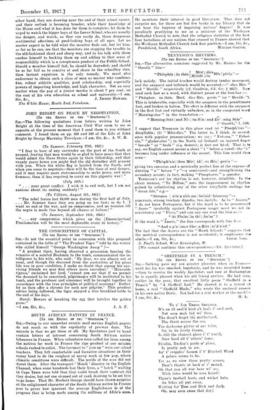SOUTH AFRICAN NATIVES IN FRANCE.
(TO VIZ EDITOR OF TEL: •. Stovrrros.".1
Sra,—Owing to our somewhat erratic mail service English papers do not reach us with the regularity of pre-war days. The miracle is that we get them at all. My Spectators just to hand contain letters of interest concerning South African native labourers in France. When volunteers were called for from among the natives for work in France the ripe product of our mission schools rushed to enlist. The foremost to "join up" were our school teachers. They left comfortable and lucrative situations in their sunny land to do the roughest of navvy work at low pay, where climatic conditions were difficult. The perils of the was did not daunt them. After the transport ' Mendi ' disaster in the English Channel, when some hundreds bast their lives, a " hatch" waiting in Cape Town were told that they could break their contract slid they desire, but not one stepped out of rank desiring to be set free togs home. That Mr. Herbert George should have shown surprise at the enlightened character of the South African native in France goes to prove how ignorant the average Englishman is of the progrees that is being made among the millionfs of Afrie's sons. He mentions their interest in good literature. That does not surprise me, for there are but few books in my library that do not bear the impress of inquiring natives' fingers: It was peculiarly gratifying to nut aa a minister of the Wesleyan Methodist Church to note that the religions statistics of the first four battalions of our natives that croesed to France allowed that the Wesleyan Methodist Church took first position.—I aut. Sir, Sc..
Pondoland, South Africa. WILLIAM liARNICR.


































 Previous page
Previous page